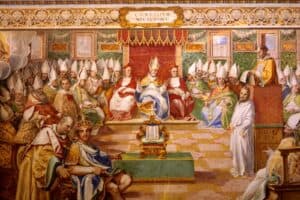Summoned to Mystery by the Creator
The truth of God's being exceeds any ability to grasp. And yet, for that very reason, it offers an inexhaustible richness to our thinking. This infinite richness and complexity is the only thing that will satisfy minds designed to contemplate unceasingly, and hearts designed to feast on wonder.
And yet there is a strand in the Christian tradition that shrinks away from wonder, seeing it as a "No Trespassing" sign, an indicator that you are on holy ground and should proceed no further. As a popular internet video puts it:
"The Trinity is a mystery that cannot be understood by human reason, but is understood only through faith and is best confessed in the words of the Athanasian Creed, which states that we worship one God in Trinity and Trinity in unity, neither confusing the persons nor dividing the substance, that we are compelled by the Christian truth to confess that each distinct person is God and Lord, and that the deity of the Father, the Son, and the Holy Spirit is one, equal in glory, co-equal in majesty."
But this is but the barest outline of the doctrine of the Trinity: it tells you where you may not trespass, but does not get on to contemplating the mystery intellectually. It warns that the Trinity cannot be understood by human reason, thereby implying to many that it ought not to be discussed by human reason. But understanding is manifold: while the Trinity cannot be exhaustively known, it can be known; while it cannot ever be comprehended, it may be apprehended in an ever-increasing asymptotic approach by rigorous and reverent work.
Yes, the mysteries are holy ground. But that doesn't mean that we are forbidden to go forward: it means we must take off our shoes.
With this in mind, This course will explore the deep mysteries of the Christian faith: the Trinity, the Incarnation, the work of atonement, and grace. We will do so in conversation with great theologians of the past and in reverence before the great Truth to whom all these mysteries refer. What you will find will be the next layer of theological depth that will propel your worship of God with your mind on to new heights.
Come: enter into the mystery.
September 15 - November 17, 2026
Every other Tuesday, 6:30 - 8:30 pm CT
(meets 6 times)
$250 / student
*included in the Pathway to Wonder membership

Week 1: Divine Attributes and the Divinity of Christ
Plato, Arius, Athanasius and the Council of Nicea (325 AD)
Week 2: The Trinity
Gregory Nazianzen and the First Council of Constantinople (381 AD)
Week 3: Christology
Cyril of Alexandria and the Council of Ephesus (431 AD)
Week 4: Atonement Part I
Anselm of Canterbury and the Satisfaction Theory (1094-1098 AD)
Week 5: Atonement Part II
Anselm of Canterbury and the Satisfaction Theory (1094-1098 AD)
Week 6: Grace
Augustine of Hippo (426 or 427 AD)
-
If you’ve been reluctant to take a theology course because you think you’ll be in over your head, you should go for Dr. Johnson’s Christian Mysteries course. You will be reading challenging works by Aquinas, Bonaventure, St. Anselm and more, but the best part is that Junius makes it all understandable and super interesting. He guides his students towards the discovery of deep and meaningful truths through engaging discussions and well-organized lectures. I learned more in this six-week class than I have in twenty years of reading and listening to sermons. I think every Christian should take this course!
-
I just finished The Christian Mysteries class and it was a great experience! Dr. Johnson’s passion for the subject is evident as he walked us through the various nuances of Theology. Junius does a great job of keeping us engaged while shedding light on complex concepts that I honestly didn’t even think twice about growing up. The best thing is that I have grown in my relationship with God on a personal level due to meditating on the truths we’ve discussed in class and it’s challenged me to not take for granted any piece of “truth” that I may have uncovered. I can’t wait to see what else Junius has in store for his course offerings!
-
I highly recommend The Christian Mysteries. Through the context of the historical writings of some key Church Fathers, Dr. Johnson dives deep to help us understand how we settled into our theology of today. His course gave me an even greater appreciation for the amount of Spirit-inspired prayer, thought, and discussion that went into the theological understanding of Christianity based on the birth, life, death, and resurrection of Jesus Christ.